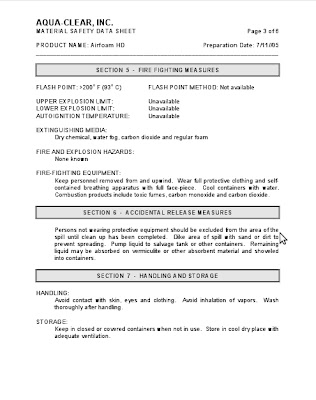
By PATRICK DONLIN - pdonlin@sungazette.com
sungazette.comMarch 17, 2010
WATERVILLE - A substance used in the natural gas drilling process is discoloring and distorting the texture of spring water running off a Cummings Township sidehill.
...
The mysterious substance was seen flowing down the slope, under the road and into Pine Creek, said Daniel T. Spadoni, spokesman for DEP's northcentral region office. Officials from another state agency alerted DEP.
"We were notified (Monday) morning by the Department of Conservation and Natural Resources," Spadoni said. "There was a white foamy material discharging from a spring down the hill."
...
Terming it a surfactant, Spadoni said a substance known as Airfoam HD* was causing the water run-off to be unnatural in appearance.
...
Surfactant used to treat Pennsylvania General Energy wells affected the water run-off, which Spadoni said had nothing to do with hydrofracturing.
Workers for the Warren-based energy company are drilling five wells in the area, high above the road, but he said they have yet to reach the point of using highly pressurized water to break the rock underneath the ground.
They were using the whitening substance as a lubricant that lowers the surface tension between air and water, according to Spadoni.
A receptionist answering a Pennsylvania General Energy phone Tuesday afternoon said company officials were not available to comment.
"They're attempting to determine what caused this problem and what actions they can take to stop it," Spadoni said of energy company representatives, with whom DEP members have been communicating.
The only precaution Spadoni recommended to residents is to avoid the suspicious spring water run-off in the area.
"I don't think you would want to drink this discharge," he said.
The substance leaking down the hill isn't listed as dangerous on a Material Safety Data Sheet, according to Spadoni.
UH-OH...
"I don't believe there are concerns about drinking water in Waterville at this time," Spadoni said, adding that area residents can continue regularly using tap water in their homes.
The investigation will continue.
"We don't know for sure what its chemical composition is," Spadoni said.
He said DEP will continue to make sure the gas company assists to dissolve the situation. (!!!)
Spadoni said there may be more than one suspect discharge.
..................................................................................................
DEP lies to residents of Waterville about chemical product hazards
Nastassja Noell
*AIRFOAM HD discharging into spring water from gas production -- Dan Spadoni of the DEP said to the reporter in this news article that the MSDS sheet states that Airfoam HD is not dangerous -- HOWEVER, Air Foam HD has high levels of a chemical called 2-BE (2-Butoxyethanol) which is strongly associated with a rare form of adrenal cancer. The MSDS sheets for Airfoam HD (see below) indicate that this chemical product can cause health problems and is also soluble in water. Water tests for 2-BE are extremely expensive, costing over $100 for a 500ppm test of a water sample (as Wayne and Angel Smith in Clearville, PA found out last winter). There is already one poster child for 2-BE contamination and this rare adrenal cancer in a gas drilling area: Laura Amos. (read more following MSDS)
..................................................................................................
Laura Amos's water became contaminated with 2-BE when "fracturing four wells on our neighbors' property (less than 1000' from [their] house) ... "blew up" [their] water well, creating or opening a hydrogeological connection between [their] water well and the gas well...
...
In August 2004 [Amos] came across a memo written to the US Forest Service and BLM Regional offices in Delta County, describing the health hazard posed by a chemical used in fluids that are injected underground to enhance the release of methane. Dr. Theo Colborn of Paonia, Colorado submitted the memo in response to decisions that were being made in Delta County by the government officials to allow gas exploration and development on the Grand Mesa. Colborn is the President of the Endocrine Disruption Exchange, Inc (TEDX) and for over 10 years directed the World Wildlife Fund's Wildlife and Contaminants Program. She has been honored worldwide for her focus on the effects of synthetic chemicals on human and wildlife health. The focus of Colborn's memo was on a chemical called 2BE, used in fracturing fluids.
The following information was taken from Colborn's report: "2BE is a highly soluble, colorless liquid with a very faint, ether like odor." She wrote that at the concentration to be used in Delta county 2BE might not be detectable through odor or taste. "2-BE has a low volatility, vaporizes slowly when mixed with water and remains well dissolved throughout the water column." "It mobilizes in soil and can easily leach into groundwater." "It could remain entrapped underground for years."
She noted it is readily absorbed by the skin and can easily be inhaled as it off-gasses in the home. Colborn cited the Agency for Toxic Substances and Disease Registry Profile that listed the following effects of 2-BE: kidney damage, kidney failure, toxicity to the spleen, the bones in the spinal column and bone marrow, liver cancer, anemia, female fertility reduction, embryo mortality, and the biggie that got my attention - elevated numbers of combined malignant and non-malignant tumors of the adrenal gland."
CLICK HERE to read Amos' entire galling tale.DEMAND ACCOUNTABILITY!























